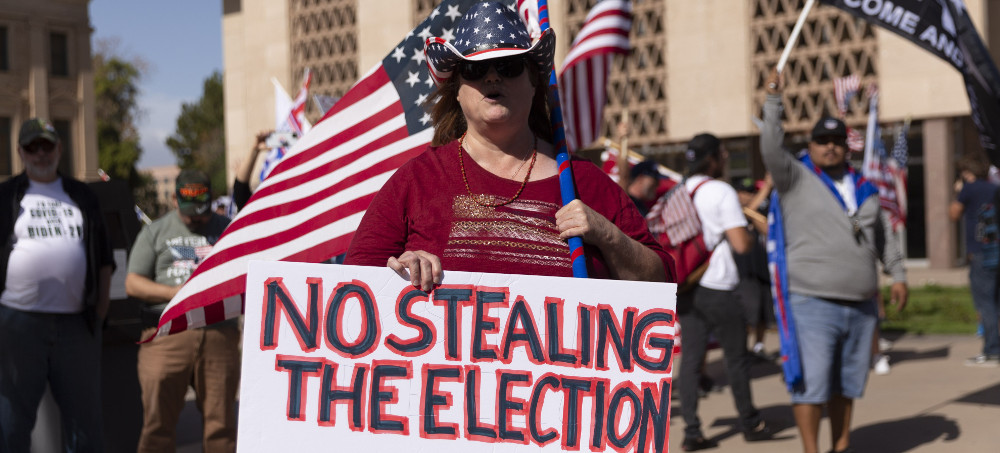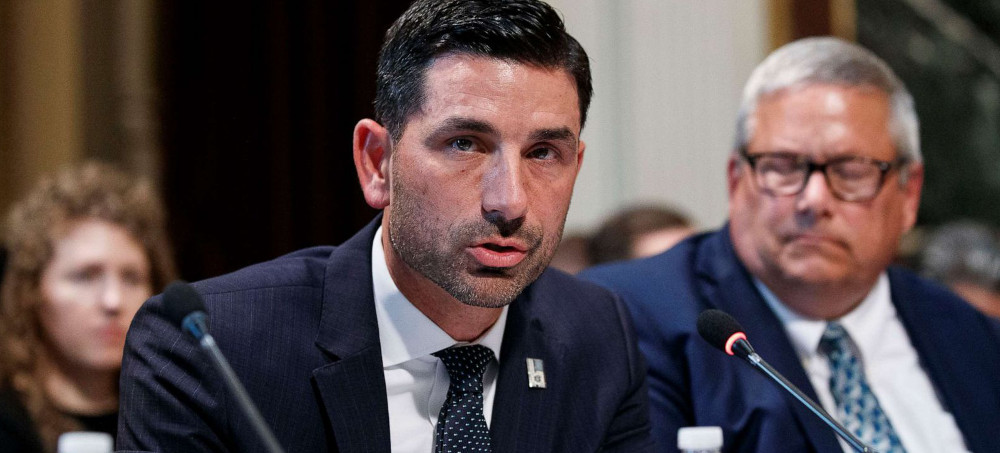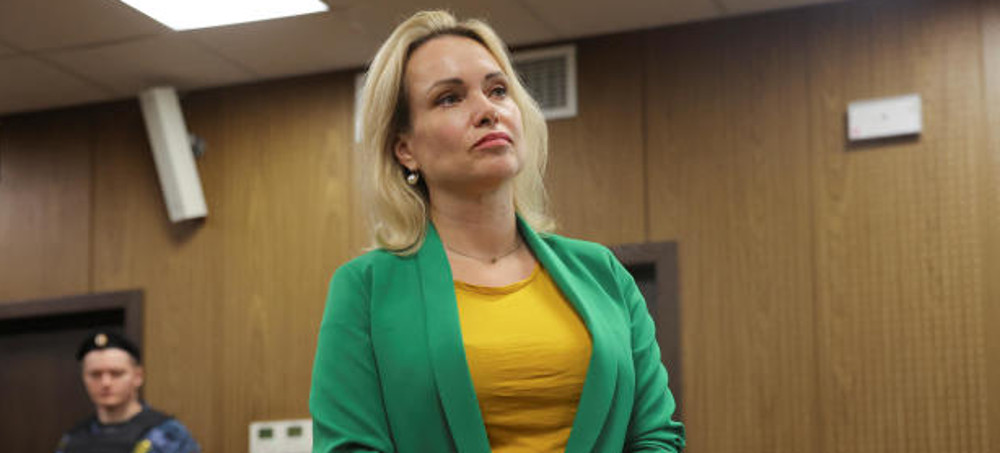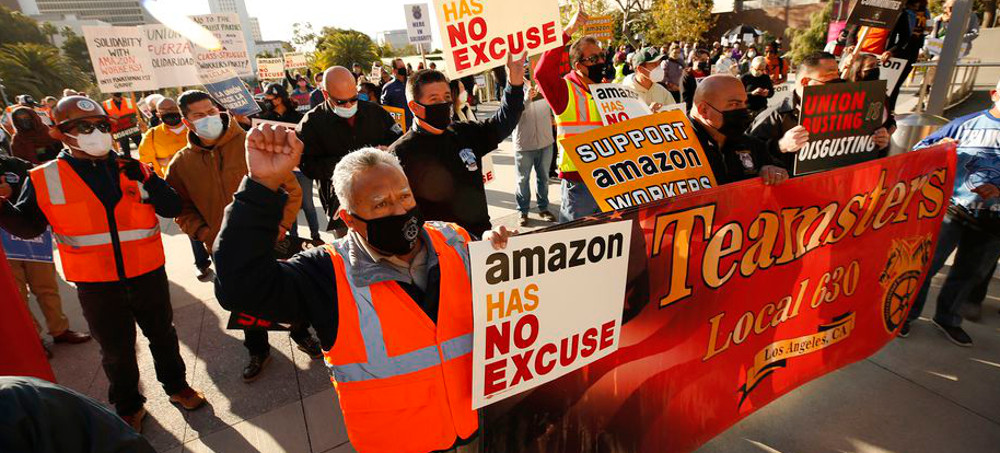Live on the homepage now!
Reader Supported News
 'Stop the Steal' protesters. (photo: Paul Spella)
'Stop the Steal' protesters. (photo: Paul Spella)
The Supreme Court may let state legislatures decide the presidency.
To understand the stakes, and the motives of Republicans who brought the case, you need only one strategic fact of political arithmetic. Six swing states—Pennsylvania, Michigan, Wisconsin, Arizona, Georgia, and North Carolina—are trending blue in presidential elections but ruled by gerrymandered Republican state legislatures. No comparable red-trending states are locked into Democratic legislatures.
Joe Biden won five of those six swing states in 2020. Donald Trump then tried and failed, lawlessly, to muscle the GOP state legislators into discarding Biden’s victory and appointing Trump electors instead. The Moore case marks the debut in the nation’s highest court of a dubious theory that could give Republicans legal cover in 2024 to do as Trump demanded in 2020. And if democracy is subverted in just a few states, it can overturn the election nationwide.
Republican lawyers, taking note of their structural advantage among battleground-state lawmakers, set forth the “independent state legislature” (ISL) doctrine. The doctrine is based on a tendentious reading of two constitutional clauses, which assign control of the “Manner” of congressional elections and the appointment of presidential electors in each state to “the Legislature thereof.” Based on that language, the doctrine proposes that state lawmakers have virtually unrestricted power over elections and electors. State courts and state constitutions, by this reading, hold no legitimate authority over legislatures in the conduct of their U.S. constitutional functions.
That is a genuinely radical proposition. It has never been accepted by any state or federal court, and the Supreme Court itself ruled as recently as 2019, in Rucho v. Common Cause, that “state constitutions can provide standards and guidance for state courts to apply” in redistricting cases. In another redistricting case four years earlier, the Court confirmed long-standing precedent that “legislative” powers are defined and controlled by state constitutions. The idea that legislatures stand unbound by any limit from their own founding documents is a fringe debating point invented for Republican political advantage.
Even so, three justices—Samuel Alito, Neil Gorsuch, and Clarence Thomas—have spent two years campaigning for the independent-state-legislature doctrine in judicial statements and dissents. None of those writings carried the force of law, but together they served as invitations for a plaintiff to bring them a case suitable to their purpose. A fourth justice, Brett Kavanaugh, wrote a concurrence in which he invited the North Carolina Republicans in the Moore case to return to the Supreme Court after losing an emergency motion. Where John Roberts and Amy Coney Barrett stand on the doctrine is unclear.
The immediate question in Moore is whether the state supreme court, applying the state constitution, can override the legislature’s choice on the manner of drawing election districts. (Until ISL came along, the long-standing answer was “yes.”) But advocates of the independent-state-legislature doctrine have their eyes on a bigger prize: the presidency.
If you give the legislature a blank check on the manner of appointing presidential electors, then a Republican majority could—in the most muscular version of ISL—simply disregard a Biden victory in the state’s popular vote and appoint Trump electors instead.
Even this Supreme Court might not go that far. It might acknowledge that, once having passed a law providing for a popular vote for president, a state legislature could not strip voters of that power after they voted. But in that case, ISL still offers plenty of room to overturn the people’s will.
In litigation over the 2020 election, Texas and other Republican-led states showed exactly how that argument would work when they asked the Supreme Court to block the certification of Biden electors in four swing states. Texas argued that the election results in Pennsylvania, Georgia, Wisconsin, and Michigan were unconstitutional because “executive and judicial officials made significant changes to the legislatively defined election laws,” for example by changing deadlines for mail-in ballots because of the coronavirus pandemic. The Supreme Court made no ruling on the merits, declining to hear the case because Texas had no standing to sue.
But if the Supreme Court adopts the ISL doctrine in Moore, the argument that Texas made will become a model in 2024. The conditions that Texas cited in its argument are almost always present in contemporary elections. Legislatures pass laws on the conduct of the vote, but election administrators have to interpret those laws and set implementing rules such as precinct locations, polling times, and counting procedures. State courts sometimes mandate changes in the rules to comply with their state constitutions. It’s all but impossible to conduct an election without making rules or choices that the legislature did not specifically authorize.
The pernicious threat of ISL, wrote Richard L. Hasen, an election-law expert at UCLA, is that “a state legislature dominated by Republicans in a state won by Democrats could simply meet and declare that local administrators or courts have deviated from the legislature’s own rules, and therefore the legislature will take matters into its own hands and choose its own slate of electors.”
But in a commentary on the Moore case, former White House Counsel Bob Bauer and the Harvard Law Professor Jack Goldsmith identified another legal threat to presidential elections that they regard as more serious. According to the Electoral Count Act, state lawmakers may discard presidential voting results and appoint electors instead by declaring that the voters have “failed to make a choice”—a phrase that is undefined in the law and was exploited in rogue vote-stealing efforts in 2020. A legislature could seize on any irregularity, or baseless allegations of fraud, to claim that voters had failed to make a choice.
This scenario is gravest if Republicans win back the House and Senate in November. It is the job of Congress to make a formal count of presidential electors, and the political interests of a GOP-led House and Senate would align with GOP state lawmakers who appointed GOP electors.
This is where reform of the Electoral Count Act, a 19th-century statute, comes in. I have written before, at length, about flaws in that law that leave the nation at risk of a broken election. A bipartisan group of senators led by Joe Manchin and Susan Collins released a draft bill last week that would make it harder for state lawmakers—or Congress—to subvert a presidential election.
Prospects for the bill’s passage are unclear, but the draft would make several valuable reforms. For one thing, it deletes the whole provision allowing lawmakers to appoint electors if voters have “failed to make a choice” on Election Day. Instead it mandates that electors “shall be appointed, in each State, on election day, in accordance with the laws of the State enacted prior to election day.” That clears up important ambiguities and forbids a state legislature to change the rules after the voters have cast their ballots.
The draft also attempts to ensure that there can be only one valid slate of electors certified in each state, specifies that the governor is (usually) the certifying authority, and gives jurisdiction to federal courts to certify a slate of electors if the state refuses to do so. If Congress passed the law, it would be agreeing to accept as “conclusive” the state’s or the court’s decision on which electors to certify.
Some of the nation’s leading election-law scholars have welcomed the bipartisan draft. But it’s unclear whether the Supreme Court’s right wing would accept the rewritten statute as constitutional. The Collins-Manchin bill arguably strips Congress of powers it holds under the Twelfth Amendment to decide which electors to count, and the Court might decide that Congress cannot relinquish those powers. Proponents of the independent-state-legislature doctrine, meanwhile, may be skeptical of giving final say on certification of electors to a governor or a federal judge, rather than to the legislature. Alito, Thomas, Gorsuch, or other justices may likewise be unwilling to accept that Congress can prevent state lawmakers from appointing an alternative slate of electors when the outcome of an election is in controversy.
Whether or not Congress decides on statutory reform, Moore could set the stage for a major shift in voting law in the run-up to the 2024 election. The Court’s right wing appears to be spoiling for that. Under traditional norms for granting certiorari, the Supreme Court would not even have put this case on its calendar. The petitioners, led by the Republican speaker of the North Carolina House, never made the ISL argument during their state trial, and legal parties ordinarily cannot raise a question on appeal that they have not raised below. According to the latest proposed schedule, the Supreme Court won’t hear Moore sooner than December. On its face, the case will be moot by then: The North Carolina redistricting map applies only to the 2022 election, which will take place the month before. Nor is there a significant conflict of opinions in lower courts for the justices to resolve.
None of these factors restrained the Supreme Court’s right-wing justices. Just as they did in overturning Roe v. Wade, a ruling they need not have made to uphold the Mississippi abortion law, the right-wing justices seized on the first available vehicle for a paradigm-shifting decision. Nothing good will come of it.
 In this Oct. 29, 2019 photo, Chad Wolf speaks during a meeting in Washington. President Donald Trump on Nov. 1 named Wolf acting head of Homeland Security. (photo: Alex Brandon/AP)
In this Oct. 29, 2019 photo, Chad Wolf speaks during a meeting in Washington. President Donald Trump on Nov. 1 named Wolf acting head of Homeland Security. (photo: Alex Brandon/AP)
DHS watchdog was alerted in February to unavailable records of top officials, but did nothing to alert or investigate
This discovery of missing records for the senior-most Homeland Security officials, which has not been previously reported, increases the volume of potential evidence that has vanished regarding the time around the Capitol attack.
It comes as both congressional and criminal investigators at the Justice Department seek to piece together an effort by Trump and his allies to overturn the results of the election, which culminated in a pro-Trump rally that became a violent riot in the halls of Congress.
The Department of Homeland Security notified the agency’s inspector general in late February that Wolf’s and Cuccinelli’s texts were lost in a “reset” of their government phones when they left their jobs in January 2021 in preparation for the new Biden administration, according to an internal record obtained by the Project on Government Oversight and shared with The Washington Post.
The office of the department’s undersecretary of management also told the government watchdog that the text messages for its boss, Undersecretary Randolph “Tex” Alles, the former Secret Service director, were also no longer available due to a previously planned phone reset.
The Office of Inspector General Joseph V. Cuffari did not press the department leadership at that time to explain why they did not preserve these records, nor seek ways to recover the lost data, according to the four people briefed on the watchdog’s actions. Cuffari also failed to alert Congress to the potential destruction of government records.
The revelation comes on the heels of the discovery that text messages of Secret Service agents — critical firsthand witnesses to the events leading up to Jan. 6 — were deleted more than a year ago and may never be recovered.
The news of their missing records set off a firestorm because the texts could have corroborated the account of a former White House aide describing the president’s state of mind on Jan. 6. In one case, the aide, Cassidy Hutchinson, said a top official told her that Trump had tried to attack a senior Secret Service agent who refused to take the president to the Capitol with his supporters marching there.
In a nearly identical scenario to that of the DHS leaders’ texts, the Secret Service alerted Cuffari’s office seven months ago, in December 2021, that the agency had deleted thousands of agents’ and employees’ text messages in an agencywide reset of government phones. Cuffari’s office did not notify Congress until mid-July, despite multiple congressional committees’ pending requests for these records.
The telephone and text communications of Wolf and Cuccinelli in the days leading up to Jan. 6 could have shed considerable light on Trump’s actions and plans. In the weeks before the attack on the Capitol, Trump had been pressuring both men to help him claim the 2020 election results were rigged and even to seize voting machines in key swing states to try to “re-run” the election.
“It is extremely troubling that the issue of deleted text messages related to the January 6 attack on the Capitol is not limited to the Secret Service, but also includes Chad Wolf and Ken Cuccinelli, who were running DHS at the time,” House Homeland Security Committee Chairman Bennie G. Thompson (D-Miss.) said in a statement.
“It appears the DHS Inspector General has known about these deleted texts for months but failed to notify Congress,” Thompson said. “If the Inspector General had informed Congress, we may have been able to get better records from Senior administration officials regarding one of the most tragic days in our democracy’s history.”
Neither Cuccinelli nor Wolf responded to requests for comment. DHS’s Office of Inspector General did not immediately respond to requests for comment.
On Twitter, Wolf wrote: “I complied with all data retention laws and returned all my equipment fully loaded to the Department. Full stop. DHS has all my texts, emails, phone logs, schedules, etc. Any issues with missing data needs to be addressed to DHS.”
The discovery of missing records for the top officials running the Department of Homeland Security during the final days of the Trump administration raises new questions about what could have been learned, and about what other text messages and evidence the department and other agencies may have erased, in apparent violation of the Federal Records Act.
Wolf and Cuccinelli remained at DHS as Trump openly challenged the 2020 election results, even though the agency led efforts to help state and local governments safeguard the integrity of the election results.
Starting in late December, numerous DHS intelligence units across the country were warning of extremely worrisome chatter in white nationalist and pro-Trump social media platforms that were promoting coming armed to Trump’s Jan. 6 rally and using violence to block Joe Biden from becoming president.
In late December, Trump railed in a Cabinet meeting that his secretaries were failing to properly help him investigate fraud that had corruptly “given” the election to Biden, but cited unsubstantiated claims. Trump fired Christopher Krebs as director of the Cybersecurity and Infrastructure Security Agency in a tweet after Krebs countered Trump’s claims of widespread election fraud, and he complained that Wolf should have moved faster to force Krebs out.
On New Year’s Eve of 2020, Trump also called Cuccinelli to pressure him to seize voting machines in swing states and help him block the peaceful transfer of power. Trump falsely told him that the acting attorney general had just said that it was Cuccinelli’s job to seize voting machines “and you’re not doing your job.”
Cuccinelli was in Washington on the day of the attack and toured the Capitol that night to survey the damage. Wolf was on an official trip to the Middle East.
After the Capitol attack, several lawmakers called for hearings into why DHS had failed to anticipate the threat Trump supporters posed to Congress on the day lawmakers and Vice President Mike Pence planned to certify the election results.
Wolf resigned five days after the attack on the Capitol, citing “recent events” as well as legal rulings questioning his legitimacy to continue leading the department as an acting secretary for 14 months.
“Effective 11:59 p.m. today, I am stepping down as your Acting Secretary,” Wolf wrote in a message to the department. “I am saddened to take this step, as it was my intention to serve the Department until the end of this Administration.”
In an interview days later with CNN’s Wolf Blitzer, the departing acting secretary said Trump bore some responsibility for the events of Jan. 6.
“I was disappointed that the president didn’t speak out sooner on that. I think he had a role to do that. I think, unfortunately, the administration lost a little bit of the moral high ground on this issue by not coming out sooner on it,” he said of Trump not swiftly condemning the violence.
A Government Accountability Office report in 2020 found that Wolf and Cuccinelli were ineligible to serve in their positions because their appointments had not followed the proper order of succession, an issue the GAO referred to the DHS Office of Inspector General.
Unlike Trump, Wolf did not dispute the election results and said DHS was preparing for the “orderly and smooth transition to President-elect Biden’s DHS team.”
“Welcome them, educate them, and learn from them,” Wolf said then. “They are your leaders for the next four years — a time which undoubtedly will be full of challenges and opportunities to show the American public the value of DHS and why it is worth the investment.”
Wolf had emerged as Trump’s favorite DHS chief, the president’s fourth pick for the job in just four years in office. Trump promoted his first secretary, John Kelly, to be his White House chief of staff, then pushed Kelly out of that job for not complying with his orders. He fired Kelly’s successor, Kirstjen Nielsen, for balking at some of Trump’s demands for how to handle immigrants crossing the border, which Nielsen knew were illegal.
The third secretary, Nielsen’s successor, Kevin McAleenan, grew frustrated by the way Trump tried to politicize the department during his reelection effort and departed after just seven months. Then Trump named Wolf as his acting secretary and found that the fourth time was a charm. Wolf repeatedly touted Trump’s immigration record as stellar and deployed department personnel to tamp down Black Lives Matter protests in Portland, Ore., to help promote Trump’s law-and-order message to voters.
Trump appointed Cuccinelli to key DHS roles after seeing him defend his immigration agenda on television.
Trump allies still believe Wolf served him well. Wolf is among those mentioned this month in an Axios article as someone whom Trump could ask to return to government service if Trump successfully runs for president in 2024.
 Former Russian state TV employee Marina Ovsyannikova, who staged an anti-war protest on live state television and was later charged with public activity aimed at discrediting the Russian army. (photo: Evgenia Novozhenina/Reuters)
Former Russian state TV employee Marina Ovsyannikova, who staged an anti-war protest on live state television and was later charged with public activity aimed at discrediting the Russian army. (photo: Evgenia Novozhenina/Reuters)
 Teamsters Local 63 members join union workers to rally in downtown Los Angeles, California, in March 2021, to show support for unionizing Alabama Amazon workers. (photo: Amazon)
Teamsters Local 63 members join union workers to rally in downtown Los Angeles, California, in March 2021, to show support for unionizing Alabama Amazon workers. (photo: Amazon)
 A Yemeni girl walks over the rubble of a building destroyed in an airstrike carried out by the Saudi-led coalition in Sanaa on July 7, 2019. (photo: Mohammed Hamoud/Getty)
A Yemeni girl walks over the rubble of a building destroyed in an airstrike carried out by the Saudi-led coalition in Sanaa on July 7, 2019. (photo: Mohammed Hamoud/Getty)
 ExxonMobil posts second-quarter profits of $17.85bn - four times last year's figure - with Chevron making $11.62bn. (photo: Karen Bleier/AFP)
ExxonMobil posts second-quarter profits of $17.85bn - four times last year's figure - with Chevron making $11.62bn. (photo: Karen Bleier/AFP)
ExxonMobil posts second-quarter profits of $17.85bn – four times last year’s figure – with Chevron making $11.62bn
On Friday, ExxonMobil reported an unprecedented $17.85bn (£14.77bn) profit for the second quarter, nearly four times as much as the same period a year ago, and Chevron made a record $11.62bn (£9.61bn). The sky-high profits were announced one day after the UK’s Shell shattered its own profit record.
Soaring energy prices have rattled consumers and become a political flashpoint. “We’re going to make sure everybody knows Exxon’s profits,” Joe Biden said in June. “Exxon made more money than God this year.”
The record profits came after similarly outsized gains in the first quarter when the largest oil companies made close to $100bn in profits.
High energy prices are one of the leading factors driving inflation to a four-decade high in the US. Gas prices have fallen slightly in recent weeks but are now averaging $4.25 a gallon across the US, more than $1 a gallon higher than a year ago.
Consumers are facing high fuel prices not just at the pump. Soaring energy prices are being baked into delivery costs, which is driving up the cost of everything from apples to toilet paper.
One reason gasoline prices have been so high is that fewer refineries are operating in the US than before the pandemic, so there is a limit to how much gasoline can be produced.
Biden has called for the companies to increase production and refining capacities in an attempt to bring down prices. On Friday Exxon said it was expanding refinery and production in Texas and New Mexico.
Exxon, based in Irving, Texas, increased its oil and gas production as crude prices hovered above $100 a barrel. Revenue at Exxon soared to $115.68bn, up from $67.74bn during the same quarter last year.
Natural gas and liquefied natural gas (LNG) prices are also elevated due to Russia’s invasion of Ukraine and ensuing sanctions against Russia, a large supplier of natural gas. Many European nations have been scrambling for alternatives to Russian natural gas, and have been competing for boatloads of LNG, driving up prices for natural gas globally and in the US.
In addition to oil company executives, shareholders also reaped the benefits of high energy prices during the quarter. Since the start of 2022, Exxon and Chevron shares have risen close to 46% and 26%, respectively.
Exxon’s CEO, Darren Woods, attributed the company’s success to its investments in oil and gas fields in Guyana and the Permian Basin, as well as its investments in liquefied natural gas, which has been in high demand globally.
“We’re also helping meet increased demand by expanding our refining capacity by about 250,000 barrels per day in the first quarter of 2023 – representing the industry’s largest single capacity addition in the US since 2012,” Woods said in a prepared statement.
Chevron’s chief executive officer, Mike Wirth, sought to tamp down criticism that the company was profiteering at the expense of consumers.
“We more than doubled investment compared to last year to grow both traditional and new energy business lines,” Wirth said in the statement. “Chevron is increasing energy supplies to help meet the challenges facing global markets,” he said.
Exxon and Chevron’s bumper profits were announced a day after Shell posted record earnings of $11.4bn (nearly £10bn) for the three-month period from April to June.
Frances O’Grady, the general secretary of Britain’s Trades Union Congress, called the “eye-watering profits” “an insult to the millions of working people struggling to get by because of soaring energy bills.
“Working people are facing the longest and harshest wage squeeze in modern history. It’s time working people got their fair share of the wealth they create, starting with real action to bring bills down,” said O’Grady.
Special Coverage: Ukraine, A Historic Resistance
READ MORE
Follow us on facebook and twitter!
PO Box 2043 / Citrus Heights, CA 95611



No comments:
Post a Comment
Note: Only a member of this blog may post a comment.